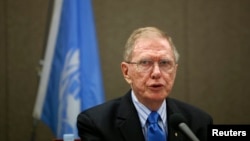North Korea’s moves to block a United Nations resolution calling for the referral of the country’s human rights situation to the International Criminal Court have failed, and the U.N. did the right thing by adopting the resolution through its human rights committee, according to the former chairman of a U.N. panel Tuesday tasked with investigating the North Korean human rights situation.
The U.N. General Assembly’s Third Committee adopted the resolution by a large margin Tuesday, with 111 countries supporting the action.
“The United Nations hasn’t been fooled by the honeyed words of North Korea in recent weeks, and has insisted that there be accountability, and that the U.N. should protect the people of North Korea,” said Michael Kirby in a phone interview with VOA, referring to Pyongyang’s recent diplomatic moves to block the resolution. Kirby headed the U.N. Commission of Inquiry.
In February, the U.N. panel released a report detailing gross human rights violations, including systematic executions, torture and mass starvation by the regime.
Human rights
The report recommended the issue be referred to the international court to hold North Korean leaders accountable for their human rights abuses, the strongest action against the regime for its human rights record. The U.N. resolution passed Tuesday is based on the report.
Kirby said he expected the U.N. action would face some challenges because of the North’s intensive diplomatic campaign and Cuba’s proposal to delete the language about the referral from the resolution, adding that Pyongyang’s “charm offensive” eventually failed.
“None of that worked. In fact, the General Assembly through the Third Committee has acted in exactly the right way and exactly the way the Commission of Inquiry recommended, and I think it’s a historic decision,” said the retired Australian judge.
The resolution sponsored by the European Union and Japan is supported by the U.S. The State Department welcomed the U.N. move.
“We think this resolution sends a clear message from the international community that the DPRK’s egregious violations of human rights are not going unnoticed by the international community, and those most responsible must be held accountable,” said State Department spokesman Jeff Rathke.
The nonbinding resolution calls for the U.N. Security Council to consider referring the North Korean human rights issue to the ICC. Most experts see the U.N. measure as a symbolic move to increase political pressure on the North Korean regime.
Dissenting nations
It is unlikely to lead to action in the international court at The Hague because of opposition by China and Russia, key members of the Council, who are expected to exercise their veto power against the resolution.
On Wednesday, Beijing reaffirmed its opposition to the U.N. action.
“We think the U.N. Security Council is not an appropriate place to discuss human rights issues. Referring human rights issues to the International Criminal Court would not solve the problem,” spokesman for China’s Foreign Ministry Hong Lei told reporters in response to the passage of the resolution.
However, Kirby rejected the notion that the resolution is doomed to fail, adding that the Council has other options to pursue to hold the regime accountable even if the measure is blocked.
“I’m not willing to accept that consequence. And I don’t think that will happen. I mean, even if immediately the case of North Korea is not referred to the International Criminal Court, there are other steps that the Security Council might decide to take,” he said.
The U.N. resolution will move to the General Assembly in the coming weeks, and it is expected to formally adopt the measure.
Jee Abbey Lee contributed to this report.
